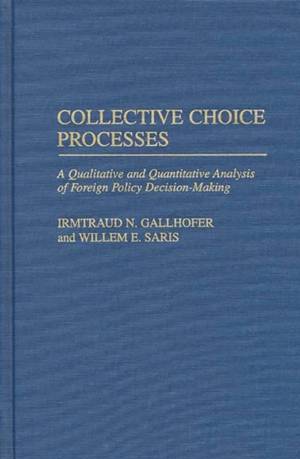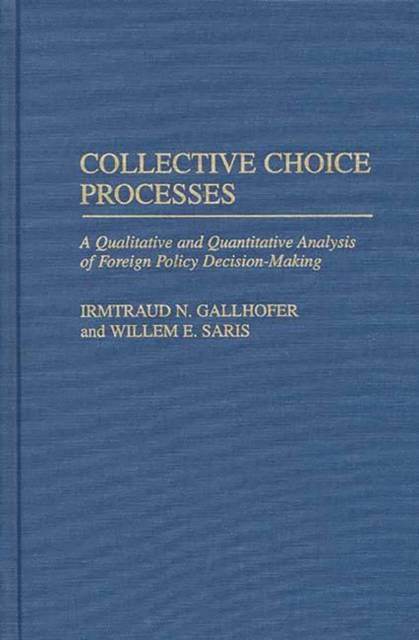
- Afhalen na 1 uur in een winkel met voorraad
- In januari gratis thuislevering in België
- Ruim aanbod met 7 miljoen producten
- Afhalen na 1 uur in een winkel met voorraad
- In januari gratis thuislevering in België
- Ruim aanbod met 7 miljoen producten
Collective Choice Processes
A Qualitative and Quantitative Analysis of Foreign Policy Decision-Making
Irmtraud N Gallhofer, Willem E SarisOmschrijving
Gallhofer and Saris examine the collective choice processes in different decision-making units leading to World Wars I and II as well as the Cuban Missile Crisis, colonial wars, and to major foreign policy decisions of a European government after World War II. In the unit relating to the European government, they find strong evidence for consensual decision-making. But when disagreements occurred among the participants, alternative procedures were employed, such as postponements in order to search for additional information, shifts from argumentation to find a compromise, and change from consensus to majority decision-making. How quickly these shifts were made depended on the group norms.
This book provides a theoretical framework to understand how different foreign-policy decision-making units or groups arrive at a collective choice. The qualitative and quantitative studies presented here are based on written records and deal with the choice process of four different decision-making units in situations that pertain to important foreign policy decisions. Germany's decision-making process under Hitler to initiate World War II exemplifies a group with a leader who is insensitive to advice, making the decisions himself and using the group only for acclamation. Kennedy's decision-making during the Cuban Missile Crisis is very different, as it shows a leader sensitive to advice where the group has the task of presenting different options and their consequences. The Austro-Hungarian cabinet's decision to initiate World War I exemplifies a homogeneous group with a dissenter, although it arrived at a collective decision quite quickly using persuasion, compromise, and some coercion. The bulk of the study deals with a heterogeneous unit in a great variety of decision situations, because most Western European governments are of this type. Where there is extreme conflict and time pressure, consensual decision-making is abandoned and a majority choice is hammered out. As the first systematic documented study of collective decision-making, as it pertains to different decision units, this book will be of considerable importance to scholars and researchers investigating the decision-making process in government and international affairs.Specificaties
Betrokkenen
- Auteur(s):
- Uitgeverij:
Inhoud
- Aantal bladzijden:
- 224
- Taal:
- Engels
Eigenschappen
- Productcode (EAN):
- 9780275960292
- Verschijningsdatum:
- 20/11/1997
- Uitvoering:
- Hardcover
- Formaat:
- Ongenaaid / garenloos gebonden
- Afmetingen:
- 152 mm x 229 mm
- Gewicht:
- 498 g

Alleen bij Standaard Boekhandel
Beoordelingen
We publiceren alleen reviews die voldoen aan de voorwaarden voor reviews. Bekijk onze voorwaarden voor reviews.









